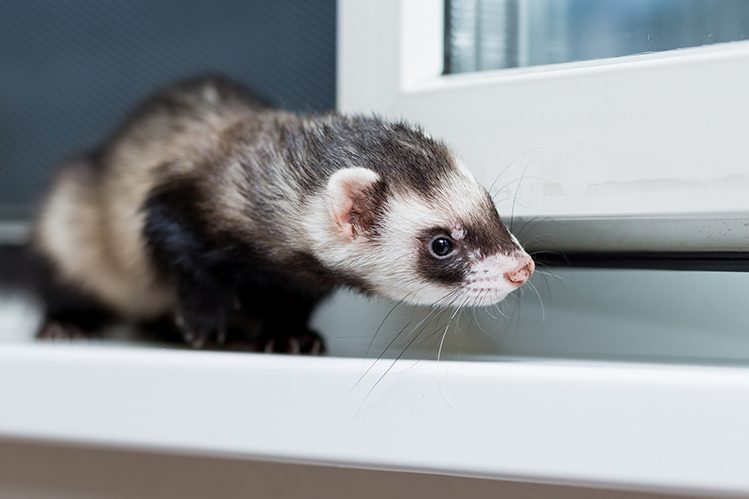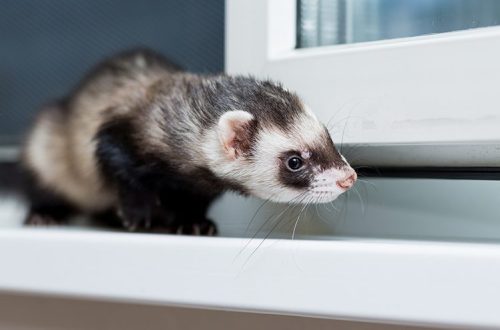
Trauma in ferrets
Ferrets are active and agile pets. However, they have a feature that you can’t guess just like that. Ferrets have a very weak skeleton, prone to fractures and dislocations. If you do not look after your pet, you can face serious consequences. Most often, ferrets get injured when falling from a height: for example, from a closet. At first glance, it may seem that everything is in order with the animal, but then it starts having problems with the musculoskeletal system. What to do?
The main causes of ferret injuries at home are:
Falling from a height, even a slight one
Getting under the feet
Dropping a heavy object on your pet
Games with children and other pets
Stuck in window frames that are in ventilation mode or under furniture such as cabinets, beds.
And ferrets love to hide under the covers or in the closet, in the master’s things. Be careful and do not leave the ferret unattended, so as not to accidentally injure him.

Owners of such active pets as ferrets need to be able to recognize the injury in time and have time to provide first aid.
Major damage includes:
Bruises
Closed hip and limb fractures
Spinal injuries
Bleeding
Electric shock
Burns
Suffocation
Insect stings that cause a severe allergic reaction
Swallowing a foreign object.
If you do not provide first aid and do not seek help, you can lose your pet.
Let’s figure out how to recognize an injury and what first aid should be provided.
- Limb fractures
Most often, fractures in ferrets occur when falling from a sofa or window sill. Ferrets do not know how to assess the level of height and the danger emanating from it.
If you notice that your pet is unable and unwilling to lean on one or more limbs, he may have a severe bruise or closed fracture. In this case, the baby will squeak and scream.
When examining the paw, you will see swelling, and if you touch it, the pet will start screaming and try to escape. In this case, try to prevent the ferret from moving, place it in a carrier and go to the doctor immediately.
- Bleeding
If the bleeding is sluggish, apply a tight bandage over the injury. You can use hemostatic powders.
If the bleeding is severe, pinch the vessels above the wound, i.e. apply a tourniquet and take the pet to a specialist as soon as possible.
- Electric shock
Ferrets love to chew on wires, and the first precaution is to keep all wires out of your pet’s line of sight.
If the baby was able to get to the thing of interest to him, he can get an electric shock to his lips and gums. In severe cases, this type of injury can lead to pulmonary edema.
Symptoms of electric shock include convulsions and difficulty breathing. In the most severe cases, cardiac arrest. Take your pet to the veterinarian as soon as possible.
- Burns
A pet can get such an injury when interacting with an open fire (gas stove, candles) or chemicals.
If the injury is caused by a non-chemical burn, then apply ice to the injury site, and then apply a compress with an anti-burn ointment. A chemical burn is washed with water and the same ointment is applied.
Take your pet to a veterinarian.
- Suffocation
Most often, choking occurs when a foreign object enters the throat. In such cases, the pet begins to choke and wheeze. If the ferret is coughing, leave it alone. Most likely, he will be able to cough up a foreign object. If the ferret cannot breathe, inspect the mouth. If you see a foreign object, try to carefully remove it.
Take your pet to the veterinarian immediately or call him at home.
- Spinal injuries
With such an injury, the pet has difficulty moving or lies in one place.
Your task is not to touch the ferret. Call a specialist as soon as possible. If this is not possible, carefully move the pet to a hard surface and take it to the veterinary clinic.
- Insect bites
When bitten, be sure to treat the site of damage with an antiseptic and antibacterial ointment. In the event of an allergic reaction, give your ferret an antihistamine (which should always be in your pet’s first aid kit) and contact your veterinarian for help.
- Swallowing a foreign object
Ferret, like a baby, drags everything into his mouth! If you see that the ferret has swallowed a foreign object (and these are not magnets, not batteries, not pills and other dangerous objects), there is no reason to panic. Most likely, the body will excrete the swallowed object naturally with feces. You will have to control this process to make sure that the item comes out. If this does not happen within a couple of days, contact your veterinarian. A swallowed object can lead to intestinal blockage, and this problem is solved only by surgery.

Ferrets are extremely mobile pets. You never know when a game can turn into a disaster. Most often, damage to ferrets occurs due to our carelessness. To avoid such situations, you need to adapt your home for a pet in advance. For example:
hide cables
put protection on the windows
close access to the first aid kit, batteries, magnets, sharp objects, household chemicals, etc.
teach children how to properly care for a ferret
make sure that the ferret does not get into the washing machine. After loading the laundry, turn it around and make sure that there is no ferret hiding in it.
to avoid falling from a height, make sure that there is lower furniture next to the table or window sill. The ferret will be able to use it as a ladder.
If the pet has to stay at home alone, prepare a comfortable enclosure for him. This will keep the ferret safe and give you peace of mind.
Such simple safety measures will help keep the ferret alive for many years, and you – once again not to worry about your tomboy.





